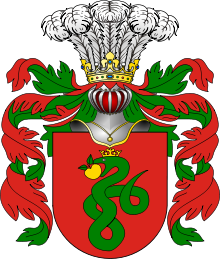
Back Guillaume Apollinaire AF Guillaume Apollinaire AN غيوم أبولينير Arabic جيوم ابولينير ARZ Guillaume Apollinaire AST Giyom Apolliner AZ قیوم آپولینر AZB Аполлинер Гийом BA Гіём Апалінер BE Гіём Апалінэр BE-X-OLD
Guillaume Apollinaire | |
|---|---|
 Photograph of Guillaume Apollinaire in spring 1916 after a shrapnel wound to his temple | |
| Born | Wilhelm Albert Włodzimierz Apolinary Kostrowicki 26 August 1880 Rome, Italy |
| Died | 9 November 1918 (aged 38) Paris, France |
| Resting place | Père Lachaise Cemetery, Paris |
| Occupation |
|
| Literary movement | Cubism, Surrealism, Orphism |
| Signature | |

Guillaume Apollinaire (French: [ɡijom apɔlinɛʁ]; born Kostrowicki;[a] 26 August 1880 – 9 November 1918) was a French poet, playwright, short story writer, novelist and art critic of Polish descent.
Apollinaire is considered one of the foremost poets of the early 20th century, as well as one of the most impassioned defenders of Cubism and a forefather of Surrealism. He is credited with coining the term "Cubism"[1] in 1911 to describe the emerging art movement, the term Orphism in 1912, and the term "Surrealism" in 1917 to describe the works of Erik Satie. He wrote poems without punctuation, in his attempt to be resolutely modern in both form and subject.[2] Apollinaire wrote one of the earliest Surrealist literary works, the play The Breasts of Tiresias (1917), which became the basis for Francis Poulenc's 1947 opera Les mamelles de Tirésias.
Influenced by Symbolist poetry in his youth, he was admired during his lifetime by the young poets who later formed the nucleus of the Surrealist group (Breton, Aragon, Soupault). He revealed very early on an originality that freed him from any school of influence and made him one of the precursors of the literary revolution of the first half of the 20th century. His art is not based on any theory, but on a simple principle: the act of creating must come from the imagination, from intuition, because it must be as close as possible to life, to nature, to the environment, and to the human being.
Apollinaire was also active as a journalist and art critic for Le Matin, L'Intransigeant, L'Esprit nouveau, Mercure de France, and Paris Journal. In 1912 Apollinaire cofounded Les Soirées de Paris, an artistic and literary magazine.
Two years after being wounded in World War I, Apollinaire died during the Spanish flu pandemic of 1918 and was recognized as "Fallen for France" (Mort pour la France) because of his commitment during the war.[3]
Cite error: There are <ref group=lower-alpha> tags or {{efn}} templates on this page, but the references will not show without a {{reflist|group=lower-alpha}} template or {{notelist}} template (see the help page).
- ^ Daniel Robbins, 1964, Albert Gleizes 1881–1953, A Retrospective Exhibition, Published by The Solomon R. Guggenheim Foundation, New York, in collaboration with Musée National d'Art Moderne, Paris, Museum am Ostwall, Dortmund
- ^ Judge, Harry George; Toyne, Anthony, eds. (1985–1993). Oxford illustrated encyclopedia. Oxford University Press. p. 18. ISBN 0-19-869129-7. OCLC 11814265.
- ^ Catherine Moore, Mark Moore, Guillaume Apollinaire official website, Biographie: Chronologie, Western Illinois University